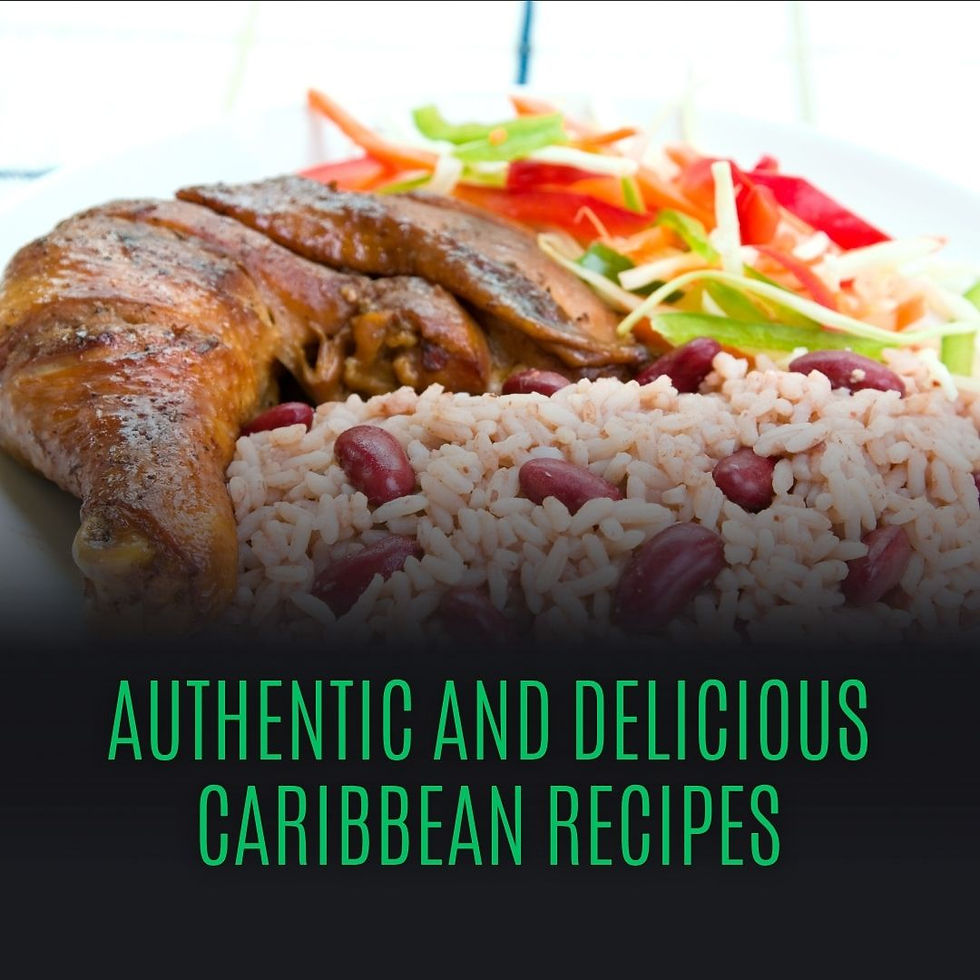Authentic and Delicious Caribbean Recipes
- Nov 9, 2025
- 4 min read
Caribbean cuisine is a vibrant tapestry woven from the diverse cultures and histories of the islands. It reflects the rich heritage of the region, blending African, Indigenous, European, and Asian influences into dishes bursting with flavor. For those passionate about exploring the Caribbean’s culinary landscape, authentic recipes offer a gateway to understanding the culture and traditions that shape this unique part of the world.
Exploring Authentic Caribbean Recipes: A Culinary Journey
Authentic Caribbean recipes are more than just food; they are stories passed down through generations. Each dish carries the essence of the islands’ history, climate, and people. From the spicy jerk chicken of Jamaica to the savory callaloo of Trinidad, these recipes showcase the diversity and creativity of Caribbean cooking.
Key Ingredients in Caribbean Cooking
Caribbean cuisine relies on fresh, local ingredients that bring bold flavors to life. Some staples include:
Scotch bonnet peppers - Known for their intense heat and fruity flavor.
Allspice (pimento) - A spice native to the Caribbean, essential in jerk seasoning.
Coconut milk - Adds richness and depth to many stews and desserts.
Tamarind - Used in sauces and drinks for a tangy twist.
Breadfruit and plantains - Versatile starchy sides that complement many dishes.
These ingredients create a balance of sweet, spicy, sour, and savory notes that define Caribbean food.
Popular Authentic Dishes to Try
Jerk Chicken: Marinated in a spicy blend of allspice, Scotch bonnet peppers, thyme, and garlic, then grilled to perfection.
Pepperpot: A hearty stew made with meat, cassareep (a sauce from cassava), and spices, popular in Guyana.
Roti: A flatbread filled with curried meats or vegetables, reflecting Indian influence.
Callaloo: A leafy green vegetable cooked with coconut milk, onions, and spices.
Flying Fish and Cou-Cou: Barbados’ national dish, combining steamed fish with cornmeal and okra.

How to Prepare Authentic Caribbean Recipes at Home
Cooking authentic Caribbean dishes at home is a rewarding experience that connects you to the islands’ culture. Here are practical tips to get started:
Start with Fresh Ingredients
Whenever possible, use fresh herbs, spices, and produce. Visit local markets or specialty stores that carry Caribbean staples like Scotch bonnet peppers, fresh thyme, and coconut milk.
Master the Marinades and Spice Blends
Many Caribbean dishes rely on complex marinades and spice blends. For example, jerk seasoning combines allspice, cinnamon, nutmeg, and Scotch bonnet peppers. Preparing these blends from scratch enhances the authenticity of your dishes.
Use Traditional Cooking Methods
Grilling over pimento wood or slow-cooking stews allows flavors to develop fully. If you don’t have access to traditional tools, a charcoal grill or slow cooker can be excellent substitutes.
Experiment with Side Dishes
Caribbean meals often include flavorful sides like rice and peas, fried plantains, or festival (a sweet fried dough). These complement the main dishes and add variety to your meal.
Follow Trusted Recipes
For those seeking inspiration, caribbean recipe ideas provide a wealth of authentic recipes from across the region. These resources offer detailed instructions and cultural context to guide your cooking journey.
The Cultural Significance of Caribbean Food
Food in the Caribbean is deeply intertwined with cultural identity and community. Meals are often shared during festivals, family gatherings, and religious celebrations, reinforcing bonds and preserving traditions.
Food as a Storyteller
Each dish tells a story of migration, adaptation, and resilience. For example, the use of spices and cooking techniques reflects the blending of African, Indigenous, and European influences. Understanding these stories enriches the culinary experience.
Celebrations and Food
Events like Carnival, Christmas, and Easter feature special dishes that highlight the season’s significance. For instance, black cake, a rich fruitcake soaked in rum, is a Christmas staple across many islands.
Supporting Local Artisans and Producers
Many Caribbean communities rely on small-scale farmers, fishermen, and artisans to supply ingredients. By choosing authentic recipes and ingredients, you support these local economies and help preserve traditional practices.
Tips for Sharing Caribbean Cuisine Globally
As Caribbean culture spreads worldwide, sharing authentic recipes helps build connections and appreciation. Here are some ways to promote Caribbean food culture:
Host Caribbean-themed dinners: Invite friends and family to experience the flavors and stories behind the dishes.
Use social media: Share photos, recipes, and cooking tips to reach a broader audience.
Collaborate with Caribbean chefs and food bloggers: Amplify voices that represent the culture authentically.
Participate in cultural festivals: Food is a central element of Caribbean festivals held globally, offering opportunities to showcase traditional dishes.
By embracing these approaches, Caribbean cuisine continues to thrive and inspire new generations.
Embracing the Caribbean Culinary Spirit
Authentic Caribbean recipes offer a delicious way to explore the region’s rich cultural heritage. Whether you are a seasoned cook or a curious beginner, these dishes invite you to savor the vibrant flavors and stories of the islands. By cooking and sharing these recipes, you contribute to preserving and celebrating Caribbean culture worldwide.
Dive into the world of Caribbean cooking and discover the joy of authentic flavors that have captivated hearts across continents. Your kitchen can become a gateway to the Caribbean’s soul, one dish at a time.








Comments